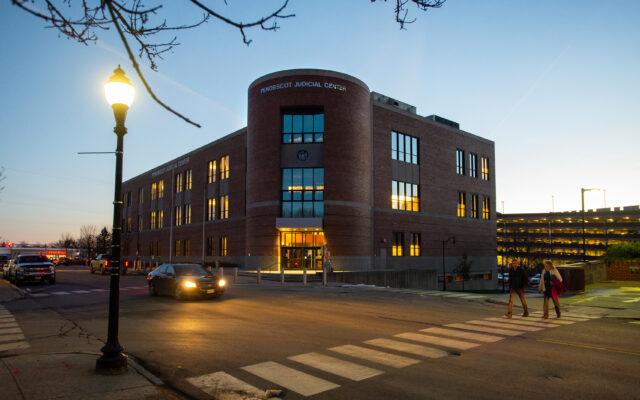
Pandemic has left backlog of criminal cases in Penobscot and Piscataquis counties
By Judy Harrison
Bangor Daily News Staff
There are 10,000 more criminal cases awaiting a resolution in Maine than there were a year ago, but the increase has been most pronounced in Penobscot and Piscataquis counties.
That’s likely the result of prosecutors in those two counties continuing to file more charges than their counterparts elsewhere, and offering defendants fewer favorable plea deals to resolve cases. The steep increase in unresolved criminal cases comes at a time when police have been urged to make fewer arrested to avoid crowding jails, where COVID-19 can spread easily. But the high backlog of unresolved cases means that defendants who can’t post bail spend more time in jail than they would have before the pandemic, adding to the population of the chronically overcrowded Penobscot County Jail in Bangor.
The backlog in unresolved criminal cases is the result of the pandemic having nearly brought Maine’s criminal justice system to a halt.

Across the state, there were 18,157 unresolved cases as of Feb. 5, up 53 percent from the same time a year earlier. But the number of unresolved cases was up by 103 percent in Penobscot and Piscataquis counties, which make up Prosecutorial District 5, where Marianne Lynch is the district attorney.
That compares to increases of 79.2 percent in York County and 45.6 percent in Cumberland County, which have been especially hard hit by COVID-19. In the prosecutorial district that includes Androscoggin, Franklin and Oxford counties, the backlog is 43 percent higher this year, while it’s 32 percent higher in the district that includes Kennebec and Somerset counties, according to state court system statistics.
While the eight elected district attorneys and their staffs handle the vast majority of criminal cases in Maine, the state attorney general’s office handles certain cases, such as homicides and major financial fraud cases.
Lynch, the district attorney for Penobscot and Piscataquis counties, said she doesn’t resolve cases simply for the sake of reducing a backlog, noting that for every case, there are “victims who have suffered from serious domestic violence, sexual assaults, significant life changing financial loss, child victims of child exploitation, death of a loved one from a motor vehicle fatality, the list goes on.”
“Numbers, without context, do not tell the entire story,” she said. “Administrative needs to reduce ‘cases’ does not outweigh my responsibility to seek appropriate outcomes based on the individualized needs of the offender and the safety of the victims and the community.”
District attorneys and police throughout Maine have employed a variety of strategies to reduce the number of people charged with crimes during the pandemic. Police have made fewer arrests to reduce jail populations, and prosecutors statewide filed 7,935 fewer new cases in 2020 than in 2019, an 18 percent drop.
But courts in southern and western Maine accounted for most of that drop. The district attorney’s office for the midcoast region filed just 182 fewer cases in 2020 than in the previous year, while 647 fewer cases were filed in Penobscot and Piscataquis counties — drops of 5 and 10 percent respectively, compared with drops of 20 percent and greater in southern and western Maine.
The numbers show that “some prosecutorial districts have been forward-thinking and either dismissing minor cases outright or making favorable plea offers [while] other districts have acted like there is no pandemic and no backlog,” said Walter McKee, a longtime criminal defense attorney in Augusta.
McKee said that he did not envy prosecutors’ difficult jobs but said they must be more proactive.
“The only way out of the current situation is for prosecutors to make the difficult decision on which cases should be further prosecuted and, for those that are to be prosecuted, whether there is a way of resolving the case with an offer that the defendant will be interested in,” he said. “Short of that, these numbers are only going to climb.”
District attorneys have adopted different strategies to resolve cases during the pandemic that they had not used before. Some have recommended that judges impose fines rather than jail time and suspend a portion of fines that aren’t mandatory. Others have offered deferred dispositions that offer a dismissal or a guilty plea to a lesser crime rather than jail time. Still other cases have been left open and on the books so defendants can address the behavior that led to the charge, such as substance use. A few district attorneys have created new diversion programs that low-level offenders can participate in before rather than after going before a judge. If defendants are successful, prosecutors don’t file charges.
Lynch said that her office offers deferred dispositions and alternative sentencing programs, and may keep cases open to allow defendants to attend classes, get suspended driver’s licenses reinstated or prove they are refraining from the conduct that led to the charges.
“In the end many of those cases are dismissed,” she said. “Our district continues to be cognizant of the needs of our community, along with the backlog, and has determined that while we may adopt a more lenient stance than we previously did in some matters in order to alleviate the backlog, a sweeping dismissal of cases does not best serve the needs of our community.”
Andrew Mead, acting chief justice of the Maine Supreme Judicial Court, said that restrictions in the number of people who can be in a courtroom and the required social distancing provide for fewer opportunities for prosecutors and defense attorneys to work with judges to resolve cases.
“Docket calls and dispositional conferences have been reduced due to the disincentive for defendants to plead guilty without the prospect of an imminent trial,” Mead said. “If a plea is entered on one of many counts and the parties consider the case to be over, it still appears on the docket as a pending matter [until sentencing].”
Prosecutors, defense attorneys and judges agree that the only way to address the backlog in a meaningful way is to resume jury trials.
“The engine that drives the criminal docket is the prospect of a looming trial,” said Mead, who as a Superior Court justice presided over hundreds of jury trials. “Our plan for addressing the backlog is hitched to the opening of additional trial opportunities, which is in turn hitched to the COVID siege subsiding.”
No jury trials have been held in the majority of the state’s courthouses in more than a year. The court system last fall began implementing a plan to resume jury trials, but the only courthouses large enough to maintain social distancing were those in Bangor and Augusta. The dramatic increase in COVID-19 cases forced the courts to curtail operations again, as they did in March, from late November through February.
Washington County is one place where a jury trial hasn’t been convened in a year, according to defense attorney Jeffrey Davidson of Machias.
“Until the jury trials begin again, a certain amount of backlog cannot be cleared out,” he said.
Jury trials are tentatively being scheduled for the spring.